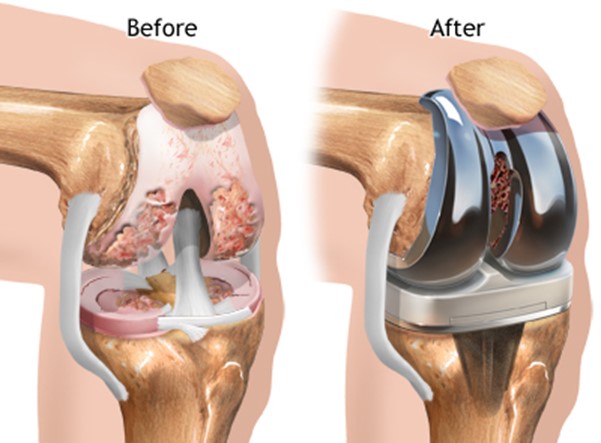A nurse is teaching a client how to manage edema following knee replacement surgery. Which of the following interventions should the nurse include in the teaching?
Apply ice packs for 15 minutes every hour.
Elevate the affected leg above the heart level.
Consume nutrition-dense foods first.
Wear compression stockings during the day.
The Correct Answer is B
Choice A reason: Applying ice packs for 15 minutes every hour is not an effective intervention for managing edema following knee replacement surgery because it can impair blood circulation and delay healing. Ice packs can also cause frostbite or nerve damage if applied for too long or too frequently. Ice packs should be used only for the first 24 to 48 hours after surgery and with a cloth barrier between the skin and the ice.
Choice B reason: Elevating the affected leg above the heart level is an effective intervention for managing edema following knee replacement surgery because it can reduce swelling and pain by facilitating venous return and lymphatic drainage. Elevation can also prevent blood clots and infection by improving blood flow and oxygen delivery to the wound site.
Choice C reason: Consuming nutrition-dense foods first is not a relevant intervention for managing edema following knee replacement surgery because it does not directly affect fluid balance or wound healing. Nutrition-dense foods are those that provide high amounts of nutrients per serving, such as eggs, cheese, nuts, beans, and meat. Nutrition-dense foods are important for overall health, but not specifically for edema management.
Choice D reason: Wearing compression stockings during the day is not a recommended intervention for managing edema following knee replacement surgery because it can interfere with wound healing and increase the risk of infection. Compression stockings can also cause skin irritation, blisters, or ulcers if worn incorrectly or too tightly. Compression stockings should be avoided until the wound is fully healed and only used under medical supervision.

Nursing Test Bank
Naxlex Comprehensive Predictor Exams
Related Questions
Correct Answer is D
Explanation
Choice A reason: Reporting ability to complete ADLs is not a specific finding that indicates that probiotic therapy is effective. Ability to complete ADLs depends on various factors, such as energy level, muscle strength, mobility, cognition, and motivation. Ability to complete ADLs may improve with parenteral nutrition, but not necessarily with probiotic therapy.
Choice B reason: Having pink mucous membranes is not a specific finding that indicates that probiotic therapy is effective. Pink mucous membranes reflect adequate hydration and oxygenation status, which are important for overall health, but not directly related to probiotic therapy.
Choice C reason: Having blood glucose level within the expected reference range is not a specific finding that indicates that probiotic therapy is effective. Blood glucose level is influenced by carbohydrate intake, insulin production, and medication use, which are related to parenteral nutrition, but not probiotic therapy.
Choice D reason: Having soft, formed bowel movements is a specific finding that indicates that probiotic therapy is effective. Probiotic therapy is the use of beneficial bacteria or yeast to restore the normal flora and function of the gastrointestinal tract, which can prevent or treat diarrhea, constipation, or infection. Having soft, formed bowel movements shows that the client has a healthy and balanced gut microbiome.

Correct Answer is D
Explanation
Choice A reason: 1 cup of brown rice contains about 84 mg of potassium, which is low compared to other foods.
Choice B reason: One medium raw tomato contains about 292 mg of potassium, which is moderate compared to other foods.
Choice C reason: 1 oz of cheddar cheese contains about 28 mg of potassium, which is very low compared to other foods.
Choice D reason: One small baked potato contains about 738 mg of potassium, which is very high compared to other foods. Potassium is important for nerve and muscle function, but too much can cause irregular heartbeat, muscle weakness, and nausea.
Whether you are a student looking to ace your exams or a practicing nurse seeking to enhance your expertise , our nursing education contents will empower you with the confidence and competence to make a difference in the lives of patients and become a respected leader in the healthcare field.
Visit Naxlex, invest in your future and unlock endless possibilities with our unparalleled nursing education contents today
Report Wrong Answer on the Current Question
Do you disagree with the answer? If yes, what is your expected answer? Explain.
Kindly be descriptive with the issue you are facing.
